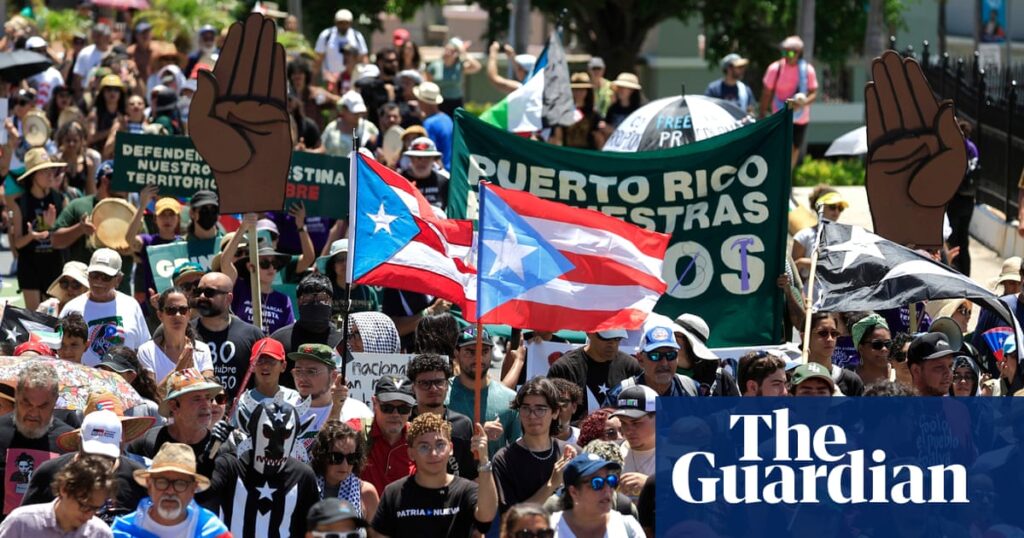Donald Trump is sending 10 F-35 fighter jets to Puerto Rico to bolster US military operations against drug cartels in the Caribbean region, it was reported on Friday.
If follows a deadly US missile strike on Tuesday on a boat in the Caribbean Sea that the Trump administration insisted was carrying 11 Venezuelan drug traffickers, and comments by the secretary of state, Marco Rubio, on Wednesday that such attacks “will happen again”.
In another development on Thursday, the US accused Venezuela of the “highly provocative move” of buzzing one of its warships in international waters.
The deployment of strike aircraft to Puerto Rico, first reported by Reuters, citing two sources briefed on the matter, is a sharp escalation of the US president’s crackdown on what he sees as a Venezuelan-led drug-trafficking menace in the region.
The planes will arrive in the US territory next week and will be part of a sustained military campaign in the Latin American region that began with Tuesday’s airstrike, the news agency said.
The F-35 is a highly advanced stealth fighter and would be very effective in combat against Venezuela’s air force, which includes F-16 aircraft.
Trump has already sent at least eight warships and other military assets to the area in recent weeks, and Rubio, speaking in Mexico City on Wednesday, warned of more operations to come.
“The US has long, for many, many years, established intelligence that allowed us to interdict and stop drug boats. And we did that. And it doesn’t work. Interdiction doesn’t work,” he told a press conference after meeting with Mexico’s president, Claudia Sheinbaum, to discuss stronger security ties.
“What will stop them is when you blow them up. Instead of interdicting it, on the president’s orders, we blew it up. And it’ll happen again. Maybe it’s happening right now.”
Meanwhile, two Venezuelan military planes flew close to a US warship in international waters, the Pentagon said on Thursday in a social media post, an act it called “a highly provocative move … designed to interfere with our counter narco-terror operations”.
The statement by the Department of Defense “strongly advised” the Venezuelan regime of embattled president Nicolás Maduro not to “obstruct, deter or interfere” with US operations.
Maduro has accused the US of “seeking a regime change through military threat” and promised to build up his own armed forces.
Last month the state department increased to $50m its reward “for information leading to the arrest and/or conviction of Maduro”, whom the US said has conspired with the Revolutionary Armed Forces of Colombia in cocaine production.
More than 50 countries, including the US, refuse to recognize Maduro as head of state after accusing him of rigging the Venezuelan presidential election in 2018.
Pete Hegseth, the US defense secretary, defended the US military buildup in the Caribbean in an appearance on Fox News on Wednesday night.
“We’ve got assets in the air, assets in the water, assets on ships, because this is a deadly serious mission for us, and it won’t stop with just this strike,” he said.
Hegseth was asked by reporters on Thursday what legal justification was used to kill 11 people that the Trump administration has accused, without presenting evidence, of being members of the Tren de Aragua criminal gang.
“We have the absolute authority and complete authority to conduct that,” he said, stating that the group was “assaulting” the US with a flow of illegal drugs.
“I’d say we smoked a drug boat, and there’s 11 narco-terrorists at the bottom of the ocean. And when other people try to do that, they’re gonna meet the same fate.”
In a statement issued on Thursday, before news of the stealth fighters’ deployment broke, Democratic Minnesota congresswoman Ilhan Omar accused the Trump administration of “lawless and reckless” actions in the Caribbean region.
“Congress has not declared war on Venezuela, or Tren de Aragua, and the mere designation of a group as a terrorist organization does not give any president carte blanche to ignore Congress’s clear constitutional authority on matters of war and peace,” she said.
“There is no conceivable legal justification for this use of force. Unless compelling evidence emerges that they were acting in self-defense, that makes the strike a clear violation of international law.”
Talking to the rightwing channel Newsmax on Wednesday, Rand Paul, the Republican US senator from Kentucky and chair of the Senate homeland security committee, also questioned the legality and morality of the Trump administration’s actions.
“[I have] no love lost for the people who died that are trying to infiltrate our country with this filth, but at the same time you have to realize it’s not as simple as it may sound, ‘let’s just kill drug dealers,’ because sometimes you have to figure out who people are before you kill them,” he said.
“Even the worst people in our country still get a trial.”
Analysts have warned that US aggression in the region will have serious unintended consequences, including the possibility of being drawn into an extended guerrilla war in Venezuela.
“I increasingly fear that the Trump administration may stumble into an intervention scenario in Venezuela, which would be frankly disastrous,” Juan González, the national security council’s senior director for the western hemisphere during the Biden administration, told the Guardian this week.
“It’ll become the cause célèbre for every kind of criminal or illegal armed group in the Americas. You’ll end up having people going to Venezuela to fight the Yankees and I think it’ll get messy.”

